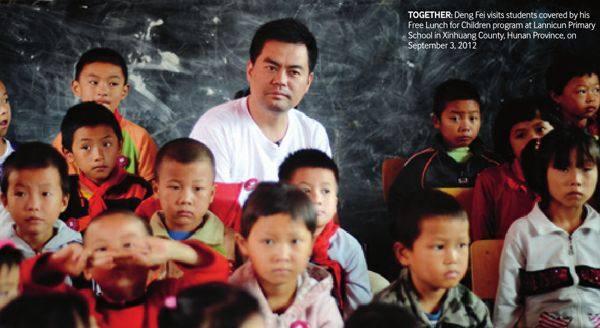Making A Difference
2013-04-29ByNiYanshuo
By Ni Yanshuo
With the bulk of its territory located in the North Temperate Zone, China sees millions of migratory birds flying southward over it in autumn and heading back north in spring. Of the eight major routes used by migratory birds worldwide, three cross over China.
However, due to illegal hunting, the number of birds migrating along the routes in China has dropped dramatically in recent years. According to figures released by China Central Television, in the 1970s, more than 1.6 million wild birds made up of more than 300 different species flew over China via the route from Siberia to Australia and New Zealand. In 2012 however, the number using the same route was less than 500,000.
“Hunting migratory birds is illegal in China and the government has taken severe measures to crack down on this behavior. However many people still violate the ban and sell captured birds to restaurants for profit,” said Deng Fei, Dean of the Journalist Department of Hong Kong-based Phoenix Weekly and an activist promoting public welfare and environmental justice.
Deng said that more individuals and social organizations need to stand up alongside government efforts to stop illegal bird hunting.
Deng, 35, was born near Dongting Lake in central Chinas Hunan Province. “Every winter, thousands of migratory birds flew to the lake. They were my childhood friends. I hate the thought of people hunting and eating them,”Deng said.
In October 2012, Deng saw pictures online of people in Hunan selling migratory birds at local markets. Some of the birds in the pictures were bleeding.
“I was upset by a picture of a seller carrying a swan and a mallard with a pole on his shoulder. These birds flew south across Hunan in the hope of surviving the winter, but they failed,”Deng said.
Deng decided to help the birds. In late 2012, he joined hands with the China Social Assistance Foundation and established Chinas first public welfare program addressing the plight of migratory birds, calling it Let the Migratory Birds Fly. Since then, 50 city newspapers have joined Dengs call to protect migratory birds.
“Thanks to all these media outlets and our nationwide network, we can pass on information on how to protect migratory birds throughout China,” Deng said.
Call to action
The program raises funds via the Internet and financially assists volunteers working in the winter habitats of migratory birds, such as Dongting Lake, Poyang Lake in central Chinas Jiangxi Province and locations around Bohai Bay in the countrys north. Dengs group call on people not to eat migratory birds and spread related information, also alerting the police when they come across people hunting or netting birds.
Before launching Let the Migratory Birds Fly, Deng had already become a famous public welfare activist. Today, his name is connected to seven nationwide programs, five for helping children and two for protecting nature.
“By launching these programs, I have changed from a talker to a doer,” Deng said.“Thats what I want to be. To change something, we need people to do something, instead of simply criticizing.”
Deng worked as an investigative journalist from 2001 to 2011, first for Hunan-based Women Today weekly and later at Phoenix Weekly. During that time, he wrote more than 160 investigative features.
Through his investigations, he uncovered many social issues. “Some of the problems really shocked me. But as a journalist, I could only record them and call people to follow and solve them,” Deng said.
Deng soon found that merely talking about the problems was not enough, so he set his eyes on public welfare programs.
In early 2011, when conducting interviews in an impoverished area in Qianxi County, southwest Chinas Guizhou Province, Deng learned that many primary school students could not afford to have lunch at school and many of them went hungry as a result.
As the father of a daughter attending primary school, Deng was well aware of the need for children to have lunch at school. He decided to do something to change the situation.
In April 2011, Deng launched a program by raising funds online and providing free lunch to primary school students in impoverished areas.
“When the Free Lunch for Children program grew bigger, I knew it was impossible for me to return to being an investigative journalist; so I shifted my concentration to public welfare,”Deng said.
Later, he went on to launch another six public welfare programs, including Let the Migratory Birds Fly.
Deng admits that managing the seven programs is arduous. Still, he is able to overcome the difficulties. “When I feel tired, I spend time with my family. Then I can relax. I am glad that my wife and daughter support me,” he said.
Honors
Deng has won numerous awards for his work.
On October 17, Deng was awarded the China Poverty Eradication Awards Innovation Award by Wang Yang, Vice Premier of the State Council. Prior to that, in April 2012, then Vice Premier Li Keqiang conferred on him the China Charity Award for his work in the Free Lunch for Children program.
“I value these honors very much and am very happy to get them as they can further publicize our public welfare programs and attract more people to join us,” Deng said, adding that the awards also increase the pressure on him and his colleagues to work harder.
“Though given to me, they also show the governments affirmation of the work of nongovernmental public welfare organizations,”Deng said. He is proud of what he and his team have done and is determined to continue pursuing his dream of helping others.
